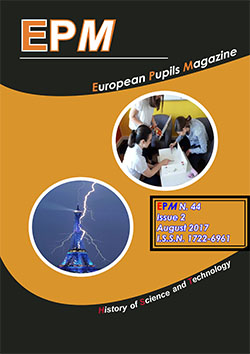Math Science Chemistry Economics Biology News Search
Human history is a period which involves rises and falls, fear and courage but mostly curiosity. Together with some studies on this period, the feelings, thoughts and perspectives of people put forward some important results. The most important of these are, of course, natural events which have major effects in human life. The fact that natural events are ignored because of fear plays a great role in the underdevelopment of societies. The most significant example of these is the Solar Eclipse.
The Sun which enlightens the whole earth with its mighty light, the glorious ray that gleams brightly up in the sky. Why does it suddenly fade the earth to black in the middle of the day, in a clear sky?
The question What happened to the sun? was answered by Herodotus’ words. Of course in that period people, instead of believing in such a simple astronomic event and searching it scientifically, preferred, in fear and doubt, to believe that evil powers were involved in it. Therefore, such kind of thought was a reason for the underdevelopment of society and it also prevented the eclipse from being solved for thousands of years. That fear has had such an enormous place in the sub-conscious of society that we can still see the effects of it.
Eclipses appear often in the mythology and literature of different cultures and different ages, most often as symbols of obliteration, fear, and the overthrow of the natural order of things. The word eclipse comes from a Greek word meaning abandonment. Quite literally, an eclipse was seen as the sun abandoning the earth.
So, what did Herodotus say?
The first recorded sun eclipse goes back to 3769 years ago, exactly on June 15, 763, B.C; that event has an important place in ancient Asia chronology and is also mentioned in the Assyrian epitaphs.
During a war between Meds, an ancient Iran tribe, and Syria, Herodotus reported that an eclipse took place; rumour has it that soldiers of both sides quit war and made peace. They thought that the gods did not want that war. That event reflects the culture of the society at that time. When we see the event from the perspective of ancient people, we can understand they were also right for their time. Because a Sun Eclipse is an event which creates wonder.
In pre - historic periods, the sun eclipses and the reactions of people to them were explained with mystical stories and myths. In those periods eclipses were a source of fear for the life on earth. Myths illustrate the eclipses as horrible objects or animals.
As for the Iskandinav myths, magicians used to be punished and chained. To take revenge, the magician created wolves up the sky and one of them was for the moon, it wanted to eat the moon and sometimes it succeeded in eating.
Why does the moon fade to black?
In normal mythology, there is another wolf called Skoll, which follows the SUN. It sometimes catches the sun and swallows it. The sun disappears suddenly while in China a duine dog which lives up above the sky, takes care of that duty; in another Asian culture a dragon is responsible for it. In Romania which was previously called The Kingdom of Transylvania, people widely believe in such kind of horrible myths. According to the belief of that religion people’s mis-behaviours affect the sun. Many events like that are believed to be the reasons of the Sun Eclipse.
So, what is exactly a Sun Eclipse?
An eclipse occurs when an astronomical body comes between another astronomical body and an observer that brightens it. As a result the mentioned astronomical body disappears from the sight of the observer for a short while. This is called an Eclipse.
A Sun Eclipse occurs when the moon comes between the earth and the sun and prevents the rays of the sun from reaching the earth.
When the diameter of the moon is equal to or larger than the sun’s diameter, a perfect eclipse occurs. The sun eclipse is perfect just for one part of the earth. For the other parts, a half eclipse occurs. If a sun eclipse is not Total in any parts of the earth, that one is called a Partial eclipse. And for some others that eclipse may never happen. When the sun is observed as a bright circle eclipse?
A period of sun eclipse is never longer than 8 minutes. For a Annular eclipse that period is 10/12 minutes. A very long time is necessary to observe a total eclipse in the same place. For example, since the beginning of last century, there were three perfect eclipses, one in 1912, one in 1961 and the last one in 2006.
Now by means of today’s technology, we exactly know that sun eclipses occur when the moon covers the sun disc. Therefore, we do not need to explain such kind of natural events with mystical stories and we no longer suffer from the fear that comes out of them.
Consequently, as far as I am concern, we have managed to get rid of our fears to a great extent and started to get pleasure from such a significant and glorious natural event.
Bibliography
- www.eclipse-chasers.com
- www.worldbook.com/wb/Search?st1=eclipse
- www.exploratorium.edu/eclipse/dragon.html
- www.hermit.org/eclipse
- www.bilimtarihi.org
- www.mreclipse.com
- http://www.nasa.gov/vision/universe/solarsystem/sun_earthday2006.html
Iconography
- www.mreclipse.com
- www.rezman-obs.si
- www.hoydalsvik.net
- www.hrcglobal.net
- www.akat.org


